|
TV on the Radio, "Desperate Youth, Bloodthirsty Babes"
Touch & Go
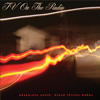 Young Liars, released this past summer, was an intoxicating shot of dark, precise sound; at once both deeply passionate and eerily chilly, the product of a gospel choral that had lost its way and preferred to creep out unsuspecting subway riders rather than bask in any holy warmth. While that EP showcased a few densely packed tracks, their new LP finds that intensity strung across a larger canvas, changing the shape and color into something that asks for more patience and observation. "The Wrong Way" is a charmer, thudding along with soupy bass and percussion as baritone and alto saxophones bleat and support the vocal harmonies of the three members, which sound like a snapping ragtime chorus, full bodied and drawling. Though the musical foundation is simple and loopy, it serves as a perfect background for the expressive vocals that rise and fall with bursts of energy, begging for the pews to raise their hands and chime in. "Ambulance" eschews any kind of pretense that Tunde Adebimpe's vocals are not the core of this band's power, dropping the fuzzy noise collages for an acapella excursion. Adebimpe's breathy triplets on the song's chorus of "I / will be / your / ac / ci / dent / if you / will be / my am / bu / lance," caress every syllable, giving them each proper consideration before spilling them out in his smooth baritone. Unfortunately, the slower tracks, like "Don't Love You," lack the amorphous, ephemeral quality that made "Blind" from their past EP such a spooky, alluring listen. Where before a lurch was arresting, visceral, here they are clumsy and cautious. "Poppy" suffers from a relatively banal guitar riff that comprises the bulk of the track. While this is hardly enough to invalidate any interest in Desperate Youth, Bloodthirsty Babes, it is indicative that the group finds themselves searching for the next step, the next mode for their sound. "Bomb Yourself" finds those brilliant harmonies sprawling across a bass heavy, dub-inflected bed, capturing a deep groove. The raw quality of TV on the Radio's energy, and their recklessly experimental tendencies make listening to every nook and cranny of their tinkered sound interesting, and hints at even more dramatic pieces in the future. - Michael Patrick Brady
Young Liars, released this past summer, was an intoxicating shot of dark, precise sound; at once both deeply passionate and eerily chilly, the product of a gospel choral that had lost its way and preferred to creep out unsuspecting subway riders rather than bask in any holy warmth. While that EP showcased a few densely packed tracks, their new LP finds that intensity strung across a larger canvas, changing the shape and color into something that asks for more patience and observation. "The Wrong Way" is a charmer, thudding along with soupy bass and percussion as baritone and alto saxophones bleat and support the vocal harmonies of the three members, which sound like a snapping ragtime chorus, full bodied and drawling. Though the musical foundation is simple and loopy, it serves as a perfect background for the expressive vocals that rise and fall with bursts of energy, begging for the pews to raise their hands and chime in. "Ambulance" eschews any kind of pretense that Tunde Adebimpe's vocals are not the core of this band's power, dropping the fuzzy noise collages for an acapella excursion. Adebimpe's breathy triplets on the song's chorus of "I / will be / your / ac / ci / dent / if you / will be / my am / bu / lance," caress every syllable, giving them each proper consideration before spilling them out in his smooth baritone. Unfortunately, the slower tracks, like "Don't Love You," lack the amorphous, ephemeral quality that made "Blind" from their past EP such a spooky, alluring listen. Where before a lurch was arresting, visceral, here they are clumsy and cautious. "Poppy" suffers from a relatively banal guitar riff that comprises the bulk of the track. While this is hardly enough to invalidate any interest in Desperate Youth, Bloodthirsty Babes, it is indicative that the group finds themselves searching for the next step, the next mode for their sound. "Bomb Yourself" finds those brilliant harmonies sprawling across a bass heavy, dub-inflected bed, capturing a deep groove. The raw quality of TV on the Radio's energy, and their recklessly experimental tendencies make listening to every nook and cranny of their tinkered sound interesting, and hints at even more dramatic pieces in the future. - Michael Patrick Brady
samples:
PLURAMON, "DREAMS TOP ROCK"
Karaoke Kalk
 The most recent in an avalanche of new music taking a crack at resurrecting the dreamy, shoegazer pop of bands like My Bloody Valentine, Slowdive and Ride, Pluramon's Dreams Top Rock only distinguishes itself from the rest of the pack by not being quite as predictable. It helps that Marcus Schmickler has recruited Julee Cruise—the serene, childlike chanteuse of so many David Lynch soundtracks—to contribute vocals to the album. Julee's last album, the dreadful The Art of Being a Girl, was such a wasted opportunity that it's a pleasure to hear her placed in the hands of a producer who can wield her peculiar vocal talents properly. Schmickler has obviously schooled himself on Julee's best work, as tracks like "Flageolea" reproduce the languid jazz and lush pop sensibility of her classic Floating Into the Night album, which was produced by Lynch and Angelo Badalamenti. Schmickler comes from a background of post-techno Powerbook composition, so much of Dreams Top Rock's sonic complexity derives from the careful overlay of laptop-treated instruments, aligned to created a densely packed architecture of guitar noise, feedback and subtle digitalia. Many of the tracks float by on pacific washes of beatific guitar noise, noise that seems at once unstructured and complexly detailed. Pluramon's overuse of stereo effects and multi-tracking can seem at times like a parlor trick, and an unoriginal one at that, but the richly nuanced storm of hazy psychedelic fuzz was enough to keep me engaged for the album's entire length. The album also has its share of good songwriting, especially "Time For a Lie," which appears twice on the album in radically different mixes. "It's a beautiful time for a lie," Cruise repeats, her voice wistfully lilting at the end of every line, each breathy refrain sending out a comet trail of echoes and reverberations which accumulate over the length of the song, like Phil Spector's wall of sound as envisioned by Loveless-era Kevin Shields. The lovely "Noise Academy" creates a complicated symphony of mutated and reprocessed vocals and instruments that radiates along with the druggy, minor-key guitar melodies. Marcus Schmickler's exacting, overly clinical, and obsessive reenactment of his obvious influences may the album's weakest aspect, but paradoxically, it's also the same inspiration that keeps the album afloat on a distorted cushion of nebulous fragility. - Jonathan Dean
The most recent in an avalanche of new music taking a crack at resurrecting the dreamy, shoegazer pop of bands like My Bloody Valentine, Slowdive and Ride, Pluramon's Dreams Top Rock only distinguishes itself from the rest of the pack by not being quite as predictable. It helps that Marcus Schmickler has recruited Julee Cruise—the serene, childlike chanteuse of so many David Lynch soundtracks—to contribute vocals to the album. Julee's last album, the dreadful The Art of Being a Girl, was such a wasted opportunity that it's a pleasure to hear her placed in the hands of a producer who can wield her peculiar vocal talents properly. Schmickler has obviously schooled himself on Julee's best work, as tracks like "Flageolea" reproduce the languid jazz and lush pop sensibility of her classic Floating Into the Night album, which was produced by Lynch and Angelo Badalamenti. Schmickler comes from a background of post-techno Powerbook composition, so much of Dreams Top Rock's sonic complexity derives from the careful overlay of laptop-treated instruments, aligned to created a densely packed architecture of guitar noise, feedback and subtle digitalia. Many of the tracks float by on pacific washes of beatific guitar noise, noise that seems at once unstructured and complexly detailed. Pluramon's overuse of stereo effects and multi-tracking can seem at times like a parlor trick, and an unoriginal one at that, but the richly nuanced storm of hazy psychedelic fuzz was enough to keep me engaged for the album's entire length. The album also has its share of good songwriting, especially "Time For a Lie," which appears twice on the album in radically different mixes. "It's a beautiful time for a lie," Cruise repeats, her voice wistfully lilting at the end of every line, each breathy refrain sending out a comet trail of echoes and reverberations which accumulate over the length of the song, like Phil Spector's wall of sound as envisioned by Loveless-era Kevin Shields. The lovely "Noise Academy" creates a complicated symphony of mutated and reprocessed vocals and instruments that radiates along with the druggy, minor-key guitar melodies. Marcus Schmickler's exacting, overly clinical, and obsessive reenactment of his obvious influences may the album's weakest aspect, but paradoxically, it's also the same inspiration that keeps the album afloat on a distorted cushion of nebulous fragility. - Jonathan Dean
samples:
Ora, "After Rainfall"
IC Studio
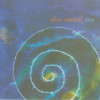 Ora was Andrew Chalk and Darren Tate with Jonathan Coleclough, Lol Coxhill, Colin Potter, and Daisuke Suzuki. Final, released in 2002, was to be this group's final album, but there were five pieces that never made it to that record because they had been lost; After Rainfall collects those five pieces and, with varying degrees of success, shuts the door on Ora. The atmosphere is a strange mix of synthetic rhythm and environmental grandeur; "Gnome Culture" is a strange crunch of musical crystals sparking in and out of the perceptible realm. The cascading rolls of sound play throughout the background and collide with a heavier churning, creating a pulsing and lively but anxiety-filled tension that simply floats away and dies. "Darkness" is, on the other hand, a mostly environmental piece composed of water drops, a cat's meow, and the rolling about of some kind of metal object. This is Ora at their best: the most simple of elements are combined in a satisfying meditation on sound painting. Clearly this is an old hut in the middle of a rainforest that is inhabited by a monk and his cat, both of whom find serenity in the sounds that creak and slither by their home. "Attribution To Memory" is amazing for the same reasons; the calls of summer birds herald the coming of a thunder storm. Wooden boards rattle and creek and the water splashes down on stone pathways, clear and pristine bells echo through the clouds, the line between natural music and composed music becomes blurred, and Ora proves that melody is everywhere. It's unfortunate that every piece on this album is not like "Darkness" or "Attribution To Memory." The synthetic sounds used on the other three tracks sound pale in comparison to the peace that is reached in the organization of natural sound. What this record has done, though, is make me want to go find more Ora to listen to. "Attribution To Memory" is, by itself, reason enough to find this record. It's a shame that Ora will no longer be making music; After Rainfall is a record that makes me want more and the only way I can find more is by looking backwards and digging for those limited releases and ultra-rare productions. - Lucas Schleicher
Ora was Andrew Chalk and Darren Tate with Jonathan Coleclough, Lol Coxhill, Colin Potter, and Daisuke Suzuki. Final, released in 2002, was to be this group's final album, but there were five pieces that never made it to that record because they had been lost; After Rainfall collects those five pieces and, with varying degrees of success, shuts the door on Ora. The atmosphere is a strange mix of synthetic rhythm and environmental grandeur; "Gnome Culture" is a strange crunch of musical crystals sparking in and out of the perceptible realm. The cascading rolls of sound play throughout the background and collide with a heavier churning, creating a pulsing and lively but anxiety-filled tension that simply floats away and dies. "Darkness" is, on the other hand, a mostly environmental piece composed of water drops, a cat's meow, and the rolling about of some kind of metal object. This is Ora at their best: the most simple of elements are combined in a satisfying meditation on sound painting. Clearly this is an old hut in the middle of a rainforest that is inhabited by a monk and his cat, both of whom find serenity in the sounds that creak and slither by their home. "Attribution To Memory" is amazing for the same reasons; the calls of summer birds herald the coming of a thunder storm. Wooden boards rattle and creek and the water splashes down on stone pathways, clear and pristine bells echo through the clouds, the line between natural music and composed music becomes blurred, and Ora proves that melody is everywhere. It's unfortunate that every piece on this album is not like "Darkness" or "Attribution To Memory." The synthetic sounds used on the other three tracks sound pale in comparison to the peace that is reached in the organization of natural sound. What this record has done, though, is make me want to go find more Ora to listen to. "Attribution To Memory" is, by itself, reason enough to find this record. It's a shame that Ora will no longer be making music; After Rainfall is a record that makes me want more and the only way I can find more is by looking backwards and digging for those limited releases and ultra-rare productions. - Lucas Schleicher
samples:
Asmus Tietchens, "FT+"
Crouton
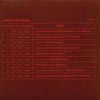 FT is for Folktales, a series of three sets of three 3" CDs that Crouton has released over recent years, each disc devoted to a single artist of electroacoustic, experimental electronic, or impov orientation. For a finale, this full-length disc finds Tietchens' remixing all three triptychs, producing nine individual tracks, each a predictably drastic reinterpretation of its source disc. While the "+" might suggest a thickening of each track into the kind of throbbing, gray industro-ambiance that made Tietchens' name the mark of quality on too many lost cassette comps from decades past, his approach here is much more subtractive, closer to the brutally minimal, ascetic technique begun somewhere around the more recent Menge series. The new mixes reduce nearly every track to a widely-scattered array of sound fragments, never slipping into glitch-like impressionism, rather working through a pensive, reserved process of manipulation, each compressed or bloated bit of sound dust given ample, isolated space. Tietchens seems intent on discovering (or creating), in each piece, those moments which stare blankly back from the disc's digital sheen, which appear absent of any relation to the whole yet arrive with a cryptic, almost mocking air. The artist has always kept his dark, wily sense of humor in the background of his releases (often highlighted by a E.M. Cioran aphorism or two), and this disc is no exception. The joke here, for me at least, is that Tietchens is, more than ever, toying with the idea of creating music where human touch has absolutely no significance. The punch line comes with the realization that Tietchens is remixing others' compositions, making his job necessarily harder. Each disc in the original Folktales series was conceptualized around the idea of narrative, with the various artists essentially telling stories through sound, making Tietchens accomplishment, though idiosyncratic itself, an effective erasure of the others' storytelling. His reconstructions could not be more remote; I'm even wary of using an adjective like "cold" for fear of suggesting that anything atmospheric emerges. The miniscule crunches, warped thuds, and deadened hums that become windows into the original recordings do allow for glimpses into the unique flow and sonorous quality of each, however Tietchens displays a tested skill for introducing shards of melody or motion while almost simultaneously enacting their disappearance. It's as if wrapped up in each stunted swell, each vestige of previous creator and previous completion, is evidence of a fundamental insubstantiality. The artist's talents are most remarkable when applied to the coarse saxophone and violin compositions from Bhob Rainey and Dan Warburton. Tietchens is able to retain the distinctiveness of each instrument, even allowing for a few melodic intervals to take shape, but he completely rejects any of the personality that comes with such age-old devices, turning them on an angle that emphasizes only their existence as machines, simple conveyances of empty sound. While on paper the artist's modus operandi has all the charm of a night spent sleeping on a board, rest assured that Tietchens does not let the potential for enjoyment slip through the cracks. He understands the audacity of his place within the little charade he's created and takes care to make the results more appealing than FT+'s faux-laboratory chart cover would indicate. This is merely Tietchens as E.M. Cioran's fatalistic hero, playing the invisible hand of time, sweeping the folklore to the hens with a smile on his face.
- Andrew Culler
FT is for Folktales, a series of three sets of three 3" CDs that Crouton has released over recent years, each disc devoted to a single artist of electroacoustic, experimental electronic, or impov orientation. For a finale, this full-length disc finds Tietchens' remixing all three triptychs, producing nine individual tracks, each a predictably drastic reinterpretation of its source disc. While the "+" might suggest a thickening of each track into the kind of throbbing, gray industro-ambiance that made Tietchens' name the mark of quality on too many lost cassette comps from decades past, his approach here is much more subtractive, closer to the brutally minimal, ascetic technique begun somewhere around the more recent Menge series. The new mixes reduce nearly every track to a widely-scattered array of sound fragments, never slipping into glitch-like impressionism, rather working through a pensive, reserved process of manipulation, each compressed or bloated bit of sound dust given ample, isolated space. Tietchens seems intent on discovering (or creating), in each piece, those moments which stare blankly back from the disc's digital sheen, which appear absent of any relation to the whole yet arrive with a cryptic, almost mocking air. The artist has always kept his dark, wily sense of humor in the background of his releases (often highlighted by a E.M. Cioran aphorism or two), and this disc is no exception. The joke here, for me at least, is that Tietchens is, more than ever, toying with the idea of creating music where human touch has absolutely no significance. The punch line comes with the realization that Tietchens is remixing others' compositions, making his job necessarily harder. Each disc in the original Folktales series was conceptualized around the idea of narrative, with the various artists essentially telling stories through sound, making Tietchens accomplishment, though idiosyncratic itself, an effective erasure of the others' storytelling. His reconstructions could not be more remote; I'm even wary of using an adjective like "cold" for fear of suggesting that anything atmospheric emerges. The miniscule crunches, warped thuds, and deadened hums that become windows into the original recordings do allow for glimpses into the unique flow and sonorous quality of each, however Tietchens displays a tested skill for introducing shards of melody or motion while almost simultaneously enacting their disappearance. It's as if wrapped up in each stunted swell, each vestige of previous creator and previous completion, is evidence of a fundamental insubstantiality. The artist's talents are most remarkable when applied to the coarse saxophone and violin compositions from Bhob Rainey and Dan Warburton. Tietchens is able to retain the distinctiveness of each instrument, even allowing for a few melodic intervals to take shape, but he completely rejects any of the personality that comes with such age-old devices, turning them on an angle that emphasizes only their existence as machines, simple conveyances of empty sound. While on paper the artist's modus operandi has all the charm of a night spent sleeping on a board, rest assured that Tietchens does not let the potential for enjoyment slip through the cracks. He understands the audacity of his place within the little charade he's created and takes care to make the results more appealing than FT+'s faux-laboratory chart cover would indicate. This is merely Tietchens as E.M. Cioran's fatalistic hero, playing the invisible hand of time, sweeping the folklore to the hens with a smile on his face.
- Andrew Culler
samples:
PELICAN, "AUSTRALASIA"
Hydra Head
 After unveiling their unique brand of instrumental heaviness on last year's untitled EP, Pelican nudge things one step further with this, their first full-length release. Australasia is that fictional land mass which, along with the Americas and Great Britain, comprises the empire of Oceania in George Orwell's 1984. Pelican create a similar topography of impending dystopia with the dark, crushing riffs of their Australasia. Pelican unashamedly summon the spirits of Black Sabbath, Master of Puppets-era Metallica and The Melvins, creating a six track album of surprising dynamism and complexity. Every track uses the same simple sonic palette: heroic minor-key riffing interwoven with layers of crunchy, expansive rhythm guitar. Their long-form compositions take each theme through several dramatic tempo changes, allowing them the chance to revisit certain key themes and gain momentum with each repetition. Pelican are instrumentalists of the highest order; their guitar symphonies are so incredibly lyrical that vocals would be an imposition. Comparisons to post-rockers Explosions in the Sky might be appropriate, but Pelican aren't interested in delayed gratification. They cut out all of the chamber-ensemble warm-up and dive in headfirst, barreling forward on their own intense propulsion. "Nightendday" imagines a sky filled with smokestacks and searchlights, a brutal dictatorial regime where the only escape is to rock as fully and as hard as possible, breaking through the barbed-wired borders of tyranny. "Angel Tears" is absolutely stunning, a sweeping, cinematic dirge imbued with a driving rhythm section that keeps threatening to upend itself, but miraculously manages to stay on track. Track five, which is purposely left untitled, is the album's sole respite: an hauntingly beautiful symphony of interlacing acoustic guitars with subtle synthesizer flourishes. It's Pelican's answer to the heavy metal power ballad. The album ends on a high note, with the monolithic 11-minute title track, full of fuzzy, cyclical riffage so massive, at high volumes on headphones it threatens to deepen the fissure of my brain. Calling this "stoner metal" would be a disservice to the precision and accuracy with which the foursome deploy their arsenal. Australasia is a substantial album, but it nonetheless leaves me with a desire to hear more. - Jonathan Dean
After unveiling their unique brand of instrumental heaviness on last year's untitled EP, Pelican nudge things one step further with this, their first full-length release. Australasia is that fictional land mass which, along with the Americas and Great Britain, comprises the empire of Oceania in George Orwell's 1984. Pelican create a similar topography of impending dystopia with the dark, crushing riffs of their Australasia. Pelican unashamedly summon the spirits of Black Sabbath, Master of Puppets-era Metallica and The Melvins, creating a six track album of surprising dynamism and complexity. Every track uses the same simple sonic palette: heroic minor-key riffing interwoven with layers of crunchy, expansive rhythm guitar. Their long-form compositions take each theme through several dramatic tempo changes, allowing them the chance to revisit certain key themes and gain momentum with each repetition. Pelican are instrumentalists of the highest order; their guitar symphonies are so incredibly lyrical that vocals would be an imposition. Comparisons to post-rockers Explosions in the Sky might be appropriate, but Pelican aren't interested in delayed gratification. They cut out all of the chamber-ensemble warm-up and dive in headfirst, barreling forward on their own intense propulsion. "Nightendday" imagines a sky filled with smokestacks and searchlights, a brutal dictatorial regime where the only escape is to rock as fully and as hard as possible, breaking through the barbed-wired borders of tyranny. "Angel Tears" is absolutely stunning, a sweeping, cinematic dirge imbued with a driving rhythm section that keeps threatening to upend itself, but miraculously manages to stay on track. Track five, which is purposely left untitled, is the album's sole respite: an hauntingly beautiful symphony of interlacing acoustic guitars with subtle synthesizer flourishes. It's Pelican's answer to the heavy metal power ballad. The album ends on a high note, with the monolithic 11-minute title track, full of fuzzy, cyclical riffage so massive, at high volumes on headphones it threatens to deepen the fissure of my brain. Calling this "stoner metal" would be a disservice to the precision and accuracy with which the foursome deploy their arsenal. Australasia is a substantial album, but it nonetheless leaves me with a desire to hear more. - Jonathan Dean
samples:
Corker/Conboy,"Radiant Idiot"
Vertical Form
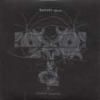 The electronic and live instrumentation mixing duo of Adrian Corker and Paul Conboy have recently been writing the next Bomb the Bass album with Tim Simenon. Ahead of that, Corker/Conboy's Radiant Idiot is a dark obsession with minor chords that transforms their music into a beautiful new creature with a life all its own. Their sophomore set is a true renovation of their formerly derivative sound with intriguing additions and finer melodies. The electronics are more an atmospheric touch than an active participant, and with new instruments joining the group's repertoire, the possibilities are endless. Shutters and delicate guitar open the record, and soon hefty live drums and a low muddy bass join in, and the guitar and the song go all filthy energy. A full-on freak-out ensues, reminding me vaguely of the new direction of Pele, and suddenly I'm eager for more. There's a drive, an urgency present, on these songs that may have been there before, but never this overt, and it's a breath of fresh air. The music is still so structured and controlled in its fluidity, like every move is planned, but I could definitely tell that these two were taking chances this time around. The slow groove of "Portland Grove Am" is simply lovely and comforting, with a simple repeated melody and layered stringed instruments overtop. Interesting guest contributions rear their heads here and there, like Ian Dixon's pulse-quickening trumpet work on "Get 1 Over." Changing rhythms also bring a freshness: a shuffle here and a dirge there with a little bit of a groove in between creates a great make-out record, with shifts in tempo bringing peaks and valleys in the action. Strangely, the only track that didn't do anything for me is the title track, also the longest at just over eight minutes. It moves like a symphony, gracefully sliding in and out of different phases, but it really doesn't get where it feels like it's going. Still, the general experience of the album is a pleasing one, and a real evolution from their previous efforts. - Rob Devlin
The electronic and live instrumentation mixing duo of Adrian Corker and Paul Conboy have recently been writing the next Bomb the Bass album with Tim Simenon. Ahead of that, Corker/Conboy's Radiant Idiot is a dark obsession with minor chords that transforms their music into a beautiful new creature with a life all its own. Their sophomore set is a true renovation of their formerly derivative sound with intriguing additions and finer melodies. The electronics are more an atmospheric touch than an active participant, and with new instruments joining the group's repertoire, the possibilities are endless. Shutters and delicate guitar open the record, and soon hefty live drums and a low muddy bass join in, and the guitar and the song go all filthy energy. A full-on freak-out ensues, reminding me vaguely of the new direction of Pele, and suddenly I'm eager for more. There's a drive, an urgency present, on these songs that may have been there before, but never this overt, and it's a breath of fresh air. The music is still so structured and controlled in its fluidity, like every move is planned, but I could definitely tell that these two were taking chances this time around. The slow groove of "Portland Grove Am" is simply lovely and comforting, with a simple repeated melody and layered stringed instruments overtop. Interesting guest contributions rear their heads here and there, like Ian Dixon's pulse-quickening trumpet work on "Get 1 Over." Changing rhythms also bring a freshness: a shuffle here and a dirge there with a little bit of a groove in between creates a great make-out record, with shifts in tempo bringing peaks and valleys in the action. Strangely, the only track that didn't do anything for me is the title track, also the longest at just over eight minutes. It moves like a symphony, gracefully sliding in and out of different phases, but it really doesn't get where it feels like it's going. Still, the general experience of the album is a pleasing one, and a real evolution from their previous efforts. - Rob Devlin
samples:
Donato Wharton,"Trabanten"
City Centre Offices
 This debut from Donato Wharton is the lost soundtrack to the works of Asimov, where each track tells of a different character in a new situation, like the various stages and chapters of "I, Robot." Stories like these must be trapped in Wharton's head, but my imagination ran wild to create chapters of my own. I found the record to be more of a love tale, where computers and devices feel, for the first time, real emotions, and try to move through life with this new knowledge, only to find how crippling these newfound and deeply wondered about feelings are. The facts — that Wharton comes from Cardiff through Stuttgart and spends his time composing music for theater works — all have voices in his brand of electronic music. All these experiences are present and accounted for when the sounds plays through the speakers. It's the emotions and feelings that are created that make this truly unique, and on Trabanten Wharton uses classic sounds to compose songs that raise genuine images and memories. "Built to Fail" starts this vision off right: the track is all awkward rhythms formed by the splicing of tracks to create a stumbling effect. There's hope, like the whole thing will get on its feet and walk like it manages to at the end, but ultimately it will fall apart again. It has to, because any effort of this kind will ultimately due to the weight and pressure of it all. "Silvester" beeps and clicks like a pining love, like a machine falls in love with the voice that travels on its wires. "Is That While Yr Still on Earth" is eavesdropping on multiple lines: the first hint that these dreams can turn dark, destroying what creates or feels them equally. And so the story progresses, track after track, as the wires try to own and possess more that they can call their own, only to find out in the end that they can't really own anything. Depressing, sure, but it's still a marvel. Just when I think this whole digital revolution is a crock and that the whole thing should just implode upon itself, I hear a CD like this one. The real crock is this: the promise of technology producing all these frank and amazing artists purely by the mass availability of sampling and recording technologies for anyone to use on their Mac or PC. There still must be artistry of some sort, some originality or unique voice that demands this technology to truly be heard, and Wharton definitely has that in spades. - Rob Devlin
This debut from Donato Wharton is the lost soundtrack to the works of Asimov, where each track tells of a different character in a new situation, like the various stages and chapters of "I, Robot." Stories like these must be trapped in Wharton's head, but my imagination ran wild to create chapters of my own. I found the record to be more of a love tale, where computers and devices feel, for the first time, real emotions, and try to move through life with this new knowledge, only to find how crippling these newfound and deeply wondered about feelings are. The facts — that Wharton comes from Cardiff through Stuttgart and spends his time composing music for theater works — all have voices in his brand of electronic music. All these experiences are present and accounted for when the sounds plays through the speakers. It's the emotions and feelings that are created that make this truly unique, and on Trabanten Wharton uses classic sounds to compose songs that raise genuine images and memories. "Built to Fail" starts this vision off right: the track is all awkward rhythms formed by the splicing of tracks to create a stumbling effect. There's hope, like the whole thing will get on its feet and walk like it manages to at the end, but ultimately it will fall apart again. It has to, because any effort of this kind will ultimately due to the weight and pressure of it all. "Silvester" beeps and clicks like a pining love, like a machine falls in love with the voice that travels on its wires. "Is That While Yr Still on Earth" is eavesdropping on multiple lines: the first hint that these dreams can turn dark, destroying what creates or feels them equally. And so the story progresses, track after track, as the wires try to own and possess more that they can call their own, only to find out in the end that they can't really own anything. Depressing, sure, but it's still a marvel. Just when I think this whole digital revolution is a crock and that the whole thing should just implode upon itself, I hear a CD like this one. The real crock is this: the promise of technology producing all these frank and amazing artists purely by the mass availability of sampling and recording technologies for anyone to use on their Mac or PC. There still must be artistry of some sort, some originality or unique voice that demands this technology to truly be heard, and Wharton definitely has that in spades. - Rob Devlin
samples:
Fuck-off Machete,"My First Machete"
Lost Dog Recordings
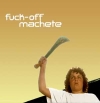 If Fuck-off Machete succeeds in nothing else, the band will at least have three things going for them: one of the best names for a rock band ever; one of the funniest album art concepts in recent memory; and more press earned for the horribly underrated Ganger, whose bassist Natasha Noramly is one of the Machete's key members. It would go like this in the record shops — Dude 1: "Who's 'Fuck-off Machete?'" Dude 2: "The chick from Ganger's new band." D1: "Who's Ganger?" D2: "Dude, come over here. You're not looking anymore, 'cause I know what you're getting." Now, for those who have already heard Ganger, this first step is unnecessary, and it's time to move right on to the Machete's solid debut. This is a stronger, angrier, and dirtier band with vocals and a lot more moxy. The same undertow of bass exists, and the same dark melodies and playful attitude, but with Noramly as the ringmaster, this circus gets wild real quick. They have a feral quality, but there's always a feeling like the bark is worse than the bite. That, or it's being carefully held in to be unleashed with a swing that cuts off the limbs and leaves bloody stumps. "Minority Gang" features her treated rasp borrowing "Would I Lie to You" by the Eurythymics, but with an ironic twist. She would, and she makes it plain. Most tracks start off with an empassioned but subdued delivery, but then the aforementioned bludgeoning arrives. It never gets too bloody, though, and occasionally, like on "Watch Them Crash," things start slow and stay there, though the Machete still gets quite a bit louder in places. Ultimately the name of the game on their debut seems to be that naked emotion gets you everywhere. Noramly even splits vocal duties here and there, all in the name of using the best voice for the task. Different songs, after all, have a different feel, and the distorted sex of her voice may not necessarily do. By the record's end, the band lets it all out on "My Machines" and then tries out a little synth and strangeness on "Panda." It's a nice touch, showing off a little of where else they can go. Next time, maybe. For now, it's a strong debut and it's nice to hear that Aereogramme isn't the only post-Ganger band with some chops. - Rob Devlin
If Fuck-off Machete succeeds in nothing else, the band will at least have three things going for them: one of the best names for a rock band ever; one of the funniest album art concepts in recent memory; and more press earned for the horribly underrated Ganger, whose bassist Natasha Noramly is one of the Machete's key members. It would go like this in the record shops — Dude 1: "Who's 'Fuck-off Machete?'" Dude 2: "The chick from Ganger's new band." D1: "Who's Ganger?" D2: "Dude, come over here. You're not looking anymore, 'cause I know what you're getting." Now, for those who have already heard Ganger, this first step is unnecessary, and it's time to move right on to the Machete's solid debut. This is a stronger, angrier, and dirtier band with vocals and a lot more moxy. The same undertow of bass exists, and the same dark melodies and playful attitude, but with Noramly as the ringmaster, this circus gets wild real quick. They have a feral quality, but there's always a feeling like the bark is worse than the bite. That, or it's being carefully held in to be unleashed with a swing that cuts off the limbs and leaves bloody stumps. "Minority Gang" features her treated rasp borrowing "Would I Lie to You" by the Eurythymics, but with an ironic twist. She would, and she makes it plain. Most tracks start off with an empassioned but subdued delivery, but then the aforementioned bludgeoning arrives. It never gets too bloody, though, and occasionally, like on "Watch Them Crash," things start slow and stay there, though the Machete still gets quite a bit louder in places. Ultimately the name of the game on their debut seems to be that naked emotion gets you everywhere. Noramly even splits vocal duties here and there, all in the name of using the best voice for the task. Different songs, after all, have a different feel, and the distorted sex of her voice may not necessarily do. By the record's end, the band lets it all out on "My Machines" and then tries out a little synth and strangeness on "Panda." It's a nice touch, showing off a little of where else they can go. Next time, maybe. For now, it's a strong debut and it's nice to hear that Aereogramme isn't the only post-Ganger band with some chops. - Rob Devlin
samples:
Un Caddie RenversÉ dans l'Herbe, "Like a packed cupboard but quite..."
Dekorder
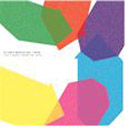 Un Caddie's last 3" CD release quickly became my favorite among Dekorder's promising early flourish of activity. The Barcelona-based artist must be pleased with the young label (started by former Disco Bruit personnel) as Like a packed cupboard is the first full-length from outside his own Ooze.Bap imprint. The record is a perfect continuation of the previous Dekorder disc, a beautiful, unassuming blanket of multiethnic instrumentation arranged via the artist's laptop, which acts merely as a locus for connecting the various parts of this one-man, transcontinental ensemble. Un Caddie keeps a dreamy, spacious mood throughout, never allowing his adventurous sound palette to the get the better of him, or drifting into technical excess. The digital looping and splicing is just enough to shift the focus away from the unique assimilation of mbira, kalimba, double bass, guitar, even berimbau, serving only to accentuate the streamlined precision at the core of Cupboard's mesmerizing, coastal ambience. The meandering pace of each track nicely suits the round organics of the instruments, minimally altered and blended with a degree of restraint that allows for the special qualities of each to shine through. Un Caddie escapes easy estimations, harping on his exploratory sound-grabbing or fusionist approach, by creating songs that arrive with a haphazard slowness, quietly building around simple, effective figures. The comparisons to Sack & Blumm elicited by the artist's previous disc are equally apt here; he creates music with a similarly bizarre sense of naïveté, as if performed by a child who'd grown up in a room where of Sub-Saharan "toys" joined the Fischer-Price piano. The artist takes up a related agenda with Cupboard's liner notes which include quotations from theorist John Hutnyk's "Critique of Exotica" and from Un Caddie himself, condemning the capitalist labeling involved in any process of cultural hybridism. Going further, he has named the tracks with URLs for web resources in ethnomusicology, cultural theory, and other awareness groups, making his interests impossible to ignore, and it's not hard to sympathize after time spent drifting along with this beautiful, label-less music.
- Andrew Culler
Un Caddie's last 3" CD release quickly became my favorite among Dekorder's promising early flourish of activity. The Barcelona-based artist must be pleased with the young label (started by former Disco Bruit personnel) as Like a packed cupboard is the first full-length from outside his own Ooze.Bap imprint. The record is a perfect continuation of the previous Dekorder disc, a beautiful, unassuming blanket of multiethnic instrumentation arranged via the artist's laptop, which acts merely as a locus for connecting the various parts of this one-man, transcontinental ensemble. Un Caddie keeps a dreamy, spacious mood throughout, never allowing his adventurous sound palette to the get the better of him, or drifting into technical excess. The digital looping and splicing is just enough to shift the focus away from the unique assimilation of mbira, kalimba, double bass, guitar, even berimbau, serving only to accentuate the streamlined precision at the core of Cupboard's mesmerizing, coastal ambience. The meandering pace of each track nicely suits the round organics of the instruments, minimally altered and blended with a degree of restraint that allows for the special qualities of each to shine through. Un Caddie escapes easy estimations, harping on his exploratory sound-grabbing or fusionist approach, by creating songs that arrive with a haphazard slowness, quietly building around simple, effective figures. The comparisons to Sack & Blumm elicited by the artist's previous disc are equally apt here; he creates music with a similarly bizarre sense of naïveté, as if performed by a child who'd grown up in a room where of Sub-Saharan "toys" joined the Fischer-Price piano. The artist takes up a related agenda with Cupboard's liner notes which include quotations from theorist John Hutnyk's "Critique of Exotica" and from Un Caddie himself, condemning the capitalist labeling involved in any process of cultural hybridism. Going further, he has named the tracks with URLs for web resources in ethnomusicology, cultural theory, and other awareness groups, making his interests impossible to ignore, and it's not hard to sympathize after time spent drifting along with this beautiful, label-less music.
- Andrew Culler
samples:
"33 RPM: Ten Hours of Sound from France"
23Five
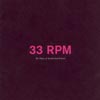 Joining Ju-Jikan: Ten Hours Of Sound From Japan and Variable Resistance: Ten Hours of Sound From Australia, 33 RPM is the companion disc to the newest installment in an ongoing sound art exhibition series at SFMOMA. "Ten Hours" is part of the exhibition title and does not refer to the amount of music on this disc, which is a full length, non-mp3 sampler of different artists from the show. Like its predecessors, 33 RPM (thankfully) does not attempt a survey of its particular country's experimental music history, instead focusing largely on newer artists with a few older luminaries included for comparison and continuity. This approach is especially welcome here, as France, unlike Japan and Australia, has a widely-documented and much-publicized history of experimental sound craft, largely a result of government-funded arts institutions such as INA GRM, one of the world's most significant sources for electroacoustic music and the incubator for Schaeffer and Henry's pioneering studies in musique concrète. 33 RPM covers a large amount of ground, touching, albeit briefly, on a wide variety of today's sound art techniques. Former Art Zoyd member and art-rock orchestrator Kasper T. Toeplitz opens the disc with uncharacteristically noisy contribution, a whirlpool of crunchy static and shredded high frequencies that would've been at home on Ju-Jikan, alongside Masonna and Merzbow. Long-standing electroacoustic duo Kristoff K. Roll provide a track more in line with their exceptional past work, "Zócalo masqué" is a fascinating snippet of audio travelogue, splicing layered machine noises with recordings from a Mexican political gathering, in preciously-detailed collage. 33 RPM's biggest name belongs to Jean-Claude Risset, a student of Boulez and one of the fathers of early computer music; however, his three-part "Resonant Sound Spaces" piece pales in comparison to Lionel Marchetti's "À rebours," which develops out of similar acousmatic sound, sourced from strings and woodwinds, cut and reattached in a slowly sinister build that makes one of the disc's best moments. Other highlights include Christophe Havel's "excerpt/metamorphosis," a pointed sculpture of machine ambience and assorted bodily noises that showcases the effect of advancing computer technologies on musique concrète technique. The capabilities of new technology are certainly manifest in exhibit curator "Laurent Dailleau's processed theremin work "It Was Too Dark to Hear Anything," the instrument dropping a vast, aquatic drone, as spacious and effective as any of the artist's work as a member of improvisers Le Complexe de la Viande. 33 RPM closes with a track from ambient techno/industrialist Mimetic that feels somewhat out of place among so much sound art, though some intriguing similarities can be established between the song's apocalyptic swoon and the work of sympathizers like Art Zoyd et al. Taken as a whole, the compilation is a strong collection of some of today's most interesting French electronic musicians and one that makes steps toward connecting these artists with their rich heritage. If anything, 33 RPM, like Ju-Jiken and Variable Resistance, will provide listeners with many fruitful introductions, new and old, surely enough to stay busy until the next installment.
- Andrew Culler
Joining Ju-Jikan: Ten Hours Of Sound From Japan and Variable Resistance: Ten Hours of Sound From Australia, 33 RPM is the companion disc to the newest installment in an ongoing sound art exhibition series at SFMOMA. "Ten Hours" is part of the exhibition title and does not refer to the amount of music on this disc, which is a full length, non-mp3 sampler of different artists from the show. Like its predecessors, 33 RPM (thankfully) does not attempt a survey of its particular country's experimental music history, instead focusing largely on newer artists with a few older luminaries included for comparison and continuity. This approach is especially welcome here, as France, unlike Japan and Australia, has a widely-documented and much-publicized history of experimental sound craft, largely a result of government-funded arts institutions such as INA GRM, one of the world's most significant sources for electroacoustic music and the incubator for Schaeffer and Henry's pioneering studies in musique concrète. 33 RPM covers a large amount of ground, touching, albeit briefly, on a wide variety of today's sound art techniques. Former Art Zoyd member and art-rock orchestrator Kasper T. Toeplitz opens the disc with uncharacteristically noisy contribution, a whirlpool of crunchy static and shredded high frequencies that would've been at home on Ju-Jikan, alongside Masonna and Merzbow. Long-standing electroacoustic duo Kristoff K. Roll provide a track more in line with their exceptional past work, "Zócalo masqué" is a fascinating snippet of audio travelogue, splicing layered machine noises with recordings from a Mexican political gathering, in preciously-detailed collage. 33 RPM's biggest name belongs to Jean-Claude Risset, a student of Boulez and one of the fathers of early computer music; however, his three-part "Resonant Sound Spaces" piece pales in comparison to Lionel Marchetti's "À rebours," which develops out of similar acousmatic sound, sourced from strings and woodwinds, cut and reattached in a slowly sinister build that makes one of the disc's best moments. Other highlights include Christophe Havel's "excerpt/metamorphosis," a pointed sculpture of machine ambience and assorted bodily noises that showcases the effect of advancing computer technologies on musique concrète technique. The capabilities of new technology are certainly manifest in exhibit curator "Laurent Dailleau's processed theremin work "It Was Too Dark to Hear Anything," the instrument dropping a vast, aquatic drone, as spacious and effective as any of the artist's work as a member of improvisers Le Complexe de la Viande. 33 RPM closes with a track from ambient techno/industrialist Mimetic that feels somewhat out of place among so much sound art, though some intriguing similarities can be established between the song's apocalyptic swoon and the work of sympathizers like Art Zoyd et al. Taken as a whole, the compilation is a strong collection of some of today's most interesting French electronic musicians and one that makes steps toward connecting these artists with their rich heritage. If anything, 33 RPM, like Ju-Jiken and Variable Resistance, will provide listeners with many fruitful introductions, new and old, surely enough to stay busy until the next installment.
- Andrew Culler
samples:
Califone, "Heron King Blues"
Thrill Jockey
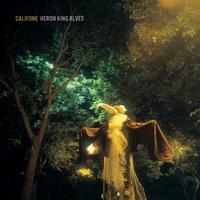 The opening notes of "Wingbone," sharp and clear as a bell are as direct as Califone wishes to get on their new record. The track possesses a tightness and clarity of meaning that will slip away across the rest of the record, though not in a bad way. Every strum and pluck rings out beautifully, vividly presenting itself before slowly fading back into the darkness. Of all the tracks on Heron King Blues, this one is the most organic and most immediately satisfying, an introduction to the extended dream about to be let loose and spill out its unconscious thoughts without elaboration. The music was crafted in a manner similar to the bands previous Declaration releases, either wholly improvised or devised in the studio. After the raw materials are put to tape, they are put through the process, cut, dubbed, and patched into an electro-acoustic meld. This approach deepens to drifting, dreamlike sprawl that pervades the record. "Apple" is dominantly percussive, bubbling with a collage of sounds of indeterminate origin, some pastiche of real drums and mechanical approximations that along with Tim Rutili's hushed, choppy vocalsgive the track a compellingly breathless tempo. "2 Sisters Drunk on Each Other" is far removed from the pastoral feel of the rest of the disc, with chiming guitars and a flanged and funky bass line. Overdubbed horns criss-cross over one another, squealing out nonsense melodies. This track seems as if it would be right at home mixed into a dance set list. Though it does stick out on the disc, it is distinctly Califone, pitting sound against sound ever so subtly to develop tension and energy in a subdued way. The title track, spanning almost fifteen minutes, is an elongated jam session that puts the strengths of the band's improvisation skills and the attentiveness of the listener to the test. While there are intriguing moments in the midst, it can be somewhat taxing. By its end, Heron King Blues has escaped form and function and spun off into a nebulous place, the band finding their voice in that mist as strong (if not as clear) as it is on solid ground. - Michael Patrick Brady
The opening notes of "Wingbone," sharp and clear as a bell are as direct as Califone wishes to get on their new record. The track possesses a tightness and clarity of meaning that will slip away across the rest of the record, though not in a bad way. Every strum and pluck rings out beautifully, vividly presenting itself before slowly fading back into the darkness. Of all the tracks on Heron King Blues, this one is the most organic and most immediately satisfying, an introduction to the extended dream about to be let loose and spill out its unconscious thoughts without elaboration. The music was crafted in a manner similar to the bands previous Declaration releases, either wholly improvised or devised in the studio. After the raw materials are put to tape, they are put through the process, cut, dubbed, and patched into an electro-acoustic meld. This approach deepens to drifting, dreamlike sprawl that pervades the record. "Apple" is dominantly percussive, bubbling with a collage of sounds of indeterminate origin, some pastiche of real drums and mechanical approximations that along with Tim Rutili's hushed, choppy vocalsgive the track a compellingly breathless tempo. "2 Sisters Drunk on Each Other" is far removed from the pastoral feel of the rest of the disc, with chiming guitars and a flanged and funky bass line. Overdubbed horns criss-cross over one another, squealing out nonsense melodies. This track seems as if it would be right at home mixed into a dance set list. Though it does stick out on the disc, it is distinctly Califone, pitting sound against sound ever so subtly to develop tension and energy in a subdued way. The title track, spanning almost fifteen minutes, is an elongated jam session that puts the strengths of the band's improvisation skills and the attentiveness of the listener to the test. While there are intriguing moments in the midst, it can be somewhat taxing. By its end, Heron King Blues has escaped form and function and spun off into a nebulous place, the band finding their voice in that mist as strong (if not as clear) as it is on solid ground. - Michael Patrick Brady
samples:
Cyclotimia, "Trivial Pleasures"
Monopoly
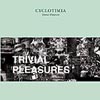 Within 25 minutes of pressing play everything in this space will be bleached, cleansed, and returned to its proper place. There is nothing out of place, no surface smudged, and no voices speaking above eachother; everything is closely, carefully, and painfully monitored. Cyclotimia's cold, cold presentation makes the setting of Orwell's 1984 seem like a happy place filled with the vibrant activity of free and strong people. The mechanical and soulless presentation makes sense, though: Trivial Pleasures comes with a booklet that outlines Nasdaq's personal mission statement and provides information on "Miniaturized, Implantable Identification Technology;" the implication is clearly that of a Big Brother atmosphere. In addition, this album was apparently inspired by Wim Merten's For Amusement Only, a composition written for pinball machines. The inspiration shows: many of the sounds are repeated loops of chimey and high pitched rings modulating through various tones. The effect is dizzying and somewhat frightening. The sounds of knives scratching together crash into a chaos of tin and other metals crushing together while synthesizers moan deep beneath the surface of some icey landscape - this is not intended for pleasant afternoon listening. For all of its alien facts, Trivial Pleasures is surprisingly fun to listen to. There's an element of cynicism that has to be appreciated in songs like "Market Experts." Horrible machines used to grind human bones to pulp churn underneath a repeated vocal loop... "analyzed by experts, analyzed by experts, analyzed by experts." Everything is perfectly safe, trust me! All that happens here is in the best interest of the people! Nothing here could be possibly be of any harm, right? And with a laugh Cyclotimia grin and continue to grind out the choking sound of capitalist industry. Though this kind of jumbled noise would normally turn me off, Trivial Pleasures manages to keep my interest. Granted, it's a short album, but that only works to its advantage.- Lucas Schleicher
Within 25 minutes of pressing play everything in this space will be bleached, cleansed, and returned to its proper place. There is nothing out of place, no surface smudged, and no voices speaking above eachother; everything is closely, carefully, and painfully monitored. Cyclotimia's cold, cold presentation makes the setting of Orwell's 1984 seem like a happy place filled with the vibrant activity of free and strong people. The mechanical and soulless presentation makes sense, though: Trivial Pleasures comes with a booklet that outlines Nasdaq's personal mission statement and provides information on "Miniaturized, Implantable Identification Technology;" the implication is clearly that of a Big Brother atmosphere. In addition, this album was apparently inspired by Wim Merten's For Amusement Only, a composition written for pinball machines. The inspiration shows: many of the sounds are repeated loops of chimey and high pitched rings modulating through various tones. The effect is dizzying and somewhat frightening. The sounds of knives scratching together crash into a chaos of tin and other metals crushing together while synthesizers moan deep beneath the surface of some icey landscape - this is not intended for pleasant afternoon listening. For all of its alien facts, Trivial Pleasures is surprisingly fun to listen to. There's an element of cynicism that has to be appreciated in songs like "Market Experts." Horrible machines used to grind human bones to pulp churn underneath a repeated vocal loop... "analyzed by experts, analyzed by experts, analyzed by experts." Everything is perfectly safe, trust me! All that happens here is in the best interest of the people! Nothing here could be possibly be of any harm, right? And with a laugh Cyclotimia grin and continue to grind out the choking sound of capitalist industry. Though this kind of jumbled noise would normally turn me off, Trivial Pleasures manages to keep my interest. Granted, it's a short album, but that only works to its advantage.- Lucas Schleicher
samples:
BOBBY CONN AND THE GLASS GYPSIES, "THE HOMELAND"
Thrill Jockey
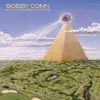 Bobby Conn was so much more charming when he was singing about akward sexual experiences, teenage cocaine parties and giving blowjobs to advance in the corporate world. Now that he's aimed his rapier wit at the ridiculously easy target of the Bush administration, he misses the mark almost completely. Perhaps my dislike for The Homeland stems from a fundamental belief that politics and rock n' roll are uneasy bedfellows. I've heard a precious few protest albums that didn't seem completely dated mere weeks after their release, and they were made by much shrewder artists that the diminutive Mr. Conn. He and his band of Glass Gypsies wade through a turgid song cycle satirizing rabid conservatism, "homeland security" and Bush's imperialistic foreign policy. Maybe it's me, but don't these seem like rather obvious targets? Does President Bush - a man so clearly idiotic, insane and willing to distort the truth in order to further his own nefarious causes - really need to be lampooned in a series of pastiches on 70's glam and arena rock? I think The Homeland answers that question, and the answer is a resounding "no." Save for one lonely track, there are no memorable tunes on the album, most of the music struggling to fit Mr. Conn's convoluted lyrics. Producer John McEntire attempts to compensate for the songwriting's obvious shortcomings by over-arranging every song, introducing a multitude of synthesizers, organs, percussion and strings so that every moment is overwhelmed with composition. On the album's opening track, "We Come in Peace," Conn tries to graft idiotic lines like "We are your friends, we come in peace/We brought our guns to set you free" onto the same Boston-style classic rock mold that made his last album The Golden Age so hilarious and memorable. Other tracks attempt poor imitations Bobby Conn's myriad other influences. Their only entertainment value lies in trying to identify which artist Conn is badly impersonating: the title track is Yes' "Heart of the Sunrise," "Relax" takes its cue from Prince, and "Home Sweet Home" is a piss-poor facsimile of Hunky Dory-era Bowie. "Bus #243" is a lone bright spot, a rollicking song that deserves a better place than this record in which to thrive. Then, suddenly and without warning, Conn summarily loses the plot, dropping his theme for four full tracks before attempting to regain it with the final track. I really hate it when artists refuse to follow up properly on their own stated goals. - Jonathan Dean
Bobby Conn was so much more charming when he was singing about akward sexual experiences, teenage cocaine parties and giving blowjobs to advance in the corporate world. Now that he's aimed his rapier wit at the ridiculously easy target of the Bush administration, he misses the mark almost completely. Perhaps my dislike for The Homeland stems from a fundamental belief that politics and rock n' roll are uneasy bedfellows. I've heard a precious few protest albums that didn't seem completely dated mere weeks after their release, and they were made by much shrewder artists that the diminutive Mr. Conn. He and his band of Glass Gypsies wade through a turgid song cycle satirizing rabid conservatism, "homeland security" and Bush's imperialistic foreign policy. Maybe it's me, but don't these seem like rather obvious targets? Does President Bush - a man so clearly idiotic, insane and willing to distort the truth in order to further his own nefarious causes - really need to be lampooned in a series of pastiches on 70's glam and arena rock? I think The Homeland answers that question, and the answer is a resounding "no." Save for one lonely track, there are no memorable tunes on the album, most of the music struggling to fit Mr. Conn's convoluted lyrics. Producer John McEntire attempts to compensate for the songwriting's obvious shortcomings by over-arranging every song, introducing a multitude of synthesizers, organs, percussion and strings so that every moment is overwhelmed with composition. On the album's opening track, "We Come in Peace," Conn tries to graft idiotic lines like "We are your friends, we come in peace/We brought our guns to set you free" onto the same Boston-style classic rock mold that made his last album The Golden Age so hilarious and memorable. Other tracks attempt poor imitations Bobby Conn's myriad other influences. Their only entertainment value lies in trying to identify which artist Conn is badly impersonating: the title track is Yes' "Heart of the Sunrise," "Relax" takes its cue from Prince, and "Home Sweet Home" is a piss-poor facsimile of Hunky Dory-era Bowie. "Bus #243" is a lone bright spot, a rollicking song that deserves a better place than this record in which to thrive. Then, suddenly and without warning, Conn summarily loses the plot, dropping his theme for four full tracks before attempting to regain it with the final track. I really hate it when artists refuse to follow up properly on their own stated goals. - Jonathan Dean
samples:
We know that our music picks may be somewhat challenging to find, which is why we have a community section which can be used to obtain nearly everything available on this site. |